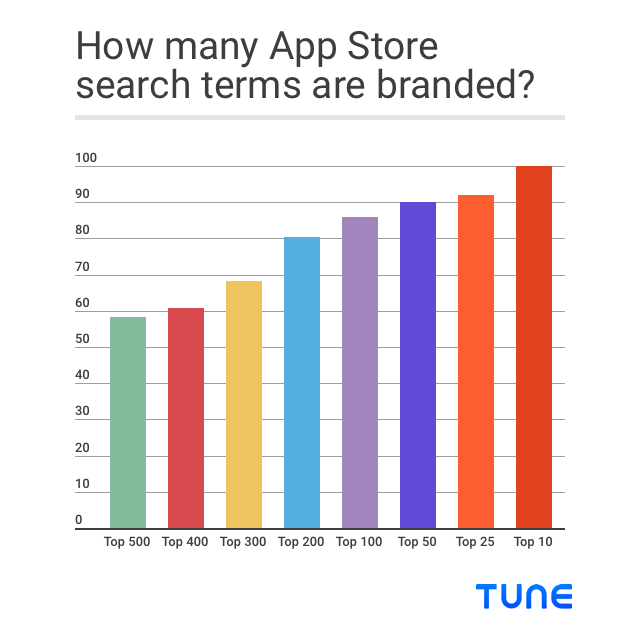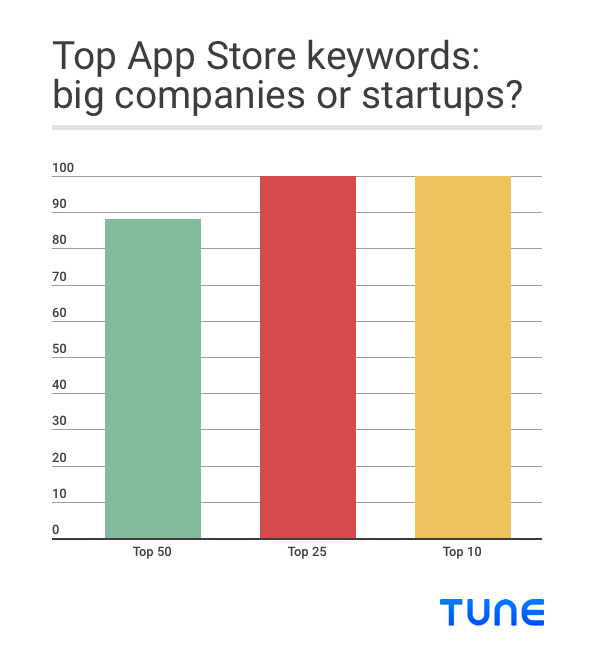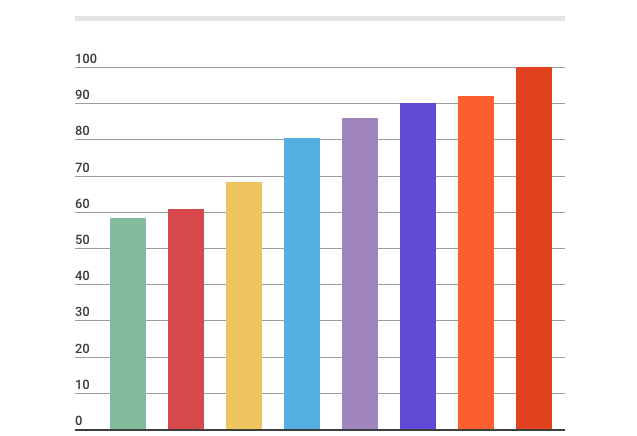This article was originally published on the TUNE blog. Branch acquired the TUNE Attribution Analytics product in September 2018, and we have republished select pieces of content for the enjoyment of Branch customers. This post was written by John Koetsier, formerly of TUNE.
People love Snapchat, Instagram, Facebook, and YouTube. Kik is really hot. And, if you want to win search on the App Store or Google Play, you’d better be prepared to do a lot of digital marketing.
Because 90% of the top keywords are branded terms.
Search still matters, and ranking still matters, tremendously. But awareness, knowledge, and intent formed outside of the App Store now clearly matter too.
Top keywords are almost all branded
That means that someone heard about your app or your company somewhere other than the App Store. And that means you’d better be a bloody good marketer … not just an app store optimizer.

Most of the top keywords are branded terms: either a company name, or an app name, or a combination of both, like “facebook messenger.” And there’s a clear progression. As the search terms get more and more popular — and more and more valuable — they are increasingly owned by brands.
Keywords: how many are brands?
- Top 500: 58.4%
- Top 400: 60.75%
- Top 300: 68.33%
- Top 200: 80.5%
- Top 100: 86%
- Top 50: 90%
- Top 25: 92%
- Top 10: 100%
Top keywords are owned by top companies
The top keywords are also overwhelming owned by big companies and big, well-funded startups. We’re talking the Amazons, Facebooks, Googles, Sonys, and Netflixes of the world. They’re beating out small, younger companies, only a few of which appear in the top 50 branded search terms. 100% of the top ten branded keywords are from major corporations and huge startups — and so are 88% of the top 50 branded search terms.

Counter-examples include Life On Air, which makes the breakout hit Houseparty, and Flipagram, if you count a startup with a $70M funding round and a possible $300M valuation as smaller and younger.
One interesting point that might provide an ASO in for younger, nimble competitors: app searchers often use keywords sets. For example, people will search for lose it, loseit, and lose it app. Another example: lucid, lucid dream, and lucid dreaming. The biggest set of keywords that I found was for Keepsafe, which keeps photos private. Potential users search for keep, keep safe, keep safe pictures, and keepsafe … almost like people are trying the minimum, and working their way up.
Keyword sets: examples
- advent, adventure quest, adventure time, adventure time games
- lose it, loseit, and lose it app
- lucid, lucid dream, and lucid dreaming
What does this mean for app marketers?
Gabe Kwakyi, co-founder and chief marketer of app developer Incipia, says that this means app discovery is in big trouble.

GABRIEL KWAKYI, CO-FOUNDER & CHIEF APP MARKETER, INCIPIA
“The implications are that ads are more important for scaling,” he told me via Slack. “You can’t count on capturing branded position to the same degree as non-brand, and especially if you don’t have tremendous volume prior to attempting to do so.”
In addition, while app store optimization is still tremendously important, discovery outside of the app store has clearly become even more important. That’s search, social, public relations and news mentions, advertising, influencer marketing, email, and the whole gamut of marketing channels.
The implication is obvious.
There will soon be no more “app marketers.” There are just marketers, some of whom focus on apps.
Yes, the ad networks, techniques, data requirements, and speed of market are all still somewhat different. But ultimately, app marketers need to be strong marketers, period. Building a brand, making a name, and telling a compelling story are becoming just as important for app marketing as big brand marketing.
Mobile marketing vs marketing on mobile
Which does not mean that mobile is not important, of course.
In fact, mobile is most important. It’s where your customers and prospects spend the majority of their digital time.
That’s why mobile is not a channel, anymore. Now, mobile is the ecosystem within which all the other traditional digital marketing channels — email, web, apps, SMS, social, etc. — live. In other words, the Venn diagram showcasing the overlap between “mobile marketing” and “marketing” is getting more and more overlapped.
Top 100 App Store keywords, by search volume
| Rank | Search Term |
| 1 | snapchat |
| 2 | |
| 3 | |
| 4 | youtube |
| 5 | kik |
| 6 | |
| 7 | tinder |
| 8 | messenger |
| 9 | pandora |
| 10 | netflix |
| 11 | spotify |
| 12 | |
| 13 | uber |
| 14 | |
| 15 | amazon |
| 16 | mario |
| 17 | bitmoji |
| 18 | games |
| 19 | lyft |
| 20 | 8 ball pool |
| 21 | pokemon go |
| 22 | |
| 23 | tumblr |
| 24 | vpn |
| 25 | super mario |
| 26 | free games |
| 27 | grindr |
| 28 | minecraft |
| 29 | skype |
| 30 | facebook app for iphone |
| 31 | fam |
| 32 | gmail |
| 33 | clash royale |
| 34 | google maps |
| 35 | roblox |
| 36 | soundcloud |
| 37 | chrome |
| 38 | facebook messenger |
| 39 | flipagram |
| 40 | house party |
| 41 | clash of clans |
| 42 | candy crush |
| 43 | photo editor |
| 44 | shazam |
| 45 | uber app |
| 46 | waze |
| 47 | pof |
| 48 | bumble |
| 49 | ebay |
| 50 | google docs |
| 51 | meet me |
| 52 | viber |
| 53 | trivia crack |
| 54 | wish |
| 55 | pic collage |
| 56 | venmo |
| 57 | google drive |
| 58 | episode |
| 59 | text free |
| 60 | snap chat |
| 61 | angry birds |
| 62 | groupon |
| 63 | imo |
| 64 | imovie |
| 65 | hulu |
| 66 | music |
| 67 | telegram |
| 68 | starbucks |
| 69 | kik messenger |
| 70 | amazon prime |
| 71 | calculator |
| 72 | color switch |
| 73 | dropbox |
| 74 | elf yourself |
| 75 | heads up |
| 76 | hooked |
| 77 | paypal |
| 78 | oovoo |
| 79 | pokemon |
| 80 | tango |
| 81 | subway surfers |
| 82 | text now |
| 83 | instasize |
| 84 | words with friends |
| 85 | yahoo mail |
| 86 | group me |
| 87 | games for free |
| 88 | hotspot shield |
| 89 | likes for instagram |
| 90 | quizlet |
| 91 | solitaire |
| 92 | vine |
| 93 | the weather channel |
| 94 | walmart |
| 95 | weather |
| 96 | video editor |
| 97 | picsart |
| 98 | |
| 99 | chase |
| 100 | after school |

